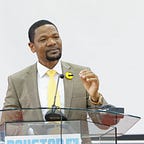Driving Innovative Thinking for Climate Solutions: Embracing the Art of Possibility
Imagine our planet as a vast canvas, with each of us holding a brush in hand. Some of us content ourselves with using the same old colors and techniques that have been used for centuries, creating familiar and uninspired landscapes.
Others, on the other hand, try to push the limits of what is possible by trying out new materials, styles, and points of view to make something truly unique and different.
When it comes to addressing climatechange, we need to be like those artists who push the boundaries of what is possible.
We must do more than copy and paste what has been done in the past, using the same old strategies and technologies that got us into this mess in the first place.
We need to innovate, to think creatively, and to take risks in pursuit of a sustainable and thriving future.
The actions we take to drive innovative thinking for climate solutions can make a real difference in rural Africa and around the world.
For example, one clear action we can take is to foster a culture of creativity and curiosity. Through our work, we have noticed that there is no absence of ideas and innovations in rural communities and rural Africa but a need for incentives, institutional coordination, and an implementation approach that brings in systems thinking. In rural Africa, we have fostered an approach called #innovativevolunteerism which means leveraging on people’s strengths to inspire them as we provide technical backstopping for them to turn their passions into profits as they drive transformational #climateaction solutions using accessible structures that are at their disposal. This has helped in providing opportunities for people to share their ideas and brainstorm together. By tapping into local communities’ diverse perspectives and experiences, we are generating new ideas and approaches tailored to local needs and resources.
Another action we can take is to collaborate and connect with diverse stakeholders.
This could mean working with local governance structures, youth, local farmers, businesses, and NGOs to develop and implement sustainable agricultural practices in rural Africa. By pooling resources and knowledge, we can create solutions that are effective and accessible to everyone while also addressing wider social and economic challenges.
Embracing emerging technologies and trends is another important action we can take to drive innovative thinking for climate solutions.
This could mean exploring renewable energy sources such as solar, wind, and hydropower in rural Africa. By embracing these new technologies, we can help communities to become more self-sufficient, reduce reliance on fossil fuels, and develop more sustainable economic models.
Investing in research and development is also crucial.
In rural Africa, this could mean supporting research into turning agricultural waste into clean energy fuel #briquettes, leveraging on local crop varieties of #cassava, an indigenous crop more resistant to drought and other climate challenges. By investing in research, we can develop the knowledge and understanding needed to create effective solutions and overcome the challenges we face.
Finally, we must learn from both successes and failures. In rural Africa, this could mean reflecting on past efforts to develop sustainable solutions that align with what work and identifying what worked well and what needs improvement. By learning from our mistakes and successes, we can continually improve our strategies and approaches, building on what has worked well and avoiding what has not.
By taking these actions, we can create a culture of innovation and creativity that drives progress in addressing climate change. We can move beyond existing solutions and explore new possibilities, just as artists push the boundaries of what is possible on their canvases.
Together, we can create a more beautiful, sustainable, and just world for all, a masterpiece of our collective efforts.
